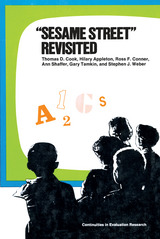3 books about Cook, Thomas D.

Managing to Make It
Urban Families and Adolescent Success
Frank F. Furstenberg, Thomas D. Cook, Jacquelynne Eccles, Glen H. Elder Jr.,
University of Chicago Press, 1999
One of the myths about families in inner-city neighborhoods is that they are characterized by poor parenting. Sociologist Frank Furstenberg and his colleagues explode this and other misconceptions about success, parenting, and socioeconomic advantage in Managing to Make It. This unique study—the first in the MacArthur Foundation Studies on Successful Adolescent Development series—focuses on how and why youth are able to overcome social disadvantages.
Based on nearly 500 interviews and case studies of families in inner-city Philadelphia, Managing to Make It lays out in detail the creative means parents use to manage risks and opportunities in their communities. More importantly, it also depicts the strategies parents develop to steer their children away from risk and toward resources that foster positive development and lead to success.
"Indispensible to anyone concerned about breaking the cycle of poverty and helplessness among at-risk adolescents, this book has a readable, graphic style easily grasped by those unfamiliar with statistical techniques." —Library Journal
Based on nearly 500 interviews and case studies of families in inner-city Philadelphia, Managing to Make It lays out in detail the creative means parents use to manage risks and opportunities in their communities. More importantly, it also depicts the strategies parents develop to steer their children away from risk and toward resources that foster positive development and lead to success.
"Indispensible to anyone concerned about breaking the cycle of poverty and helplessness among at-risk adolescents, this book has a readable, graphic style easily grasped by those unfamiliar with statistical techniques." —Library Journal
[more]

Meta-Analysis for Explanation
A Casebook
Thomas D. Cook
Russell Sage Foundation, 1992
Social science research often yields conflicting results: Does juvenile delinquent rehabilitation work? Is teenage pregnancy prevention effective? In an effort to improve the value of research for shaping social policy, social scientists are increasingly employing a powerful technique called meta-analysis. By systematically pulling together findings of a particular research problem, meta-analysis allows researchers to synthesize the results of multiple studies and detect statistically significant patterns among them. Meta-Analysis for Explanation brings exemplary illustrations of research synthesis together with expert discussion of the use of meta-analytic techniques. The emphasis throughout is on the explanatory applications of meta-analysis, a quality that makes this casebook distinct from other treatments of this methodology. The book features four detailed case studies by Betsy Jane Becker, Elizabeth C. Devine, Mark W. Lipsey, and William R. Shadish, Jr. These are offered as meta-analyses that seek both to answer the descriptive questions to which research synthesis is traditionally directed in the health and social sciences, and also to explore how a more systematic method of explanation might enhance the policy yield of research reviews. To accompany these cases, a group of the field's leading scholars has written several more general chapters that discuss the history of research synthesis, the use of meta-analysis and its value for scientific explanation, and the practical issues and challenges facing researchers who want to try this new technique. As a practical resource, Meta-Analysis for Explanation guides social scientists to greater levels of sophistication in their efforts to synthesize the results of social research. "This is an important book...[it is] another step in the continuing exploration of the wider implications and powers of meta-analytic methods." —Contemporary Psychology
[more]

Sesame Street Revisited
Thomas D. Cook
Russell Sage Foundation, 1975
In the course of its television lifetime, "Sesame Street" has taught alphabet-related skills to hundreds of thousands of preschool children. But the program may have attracted more of its regular viewers from relatively affluent homes in which the parents were better educated. Analyzing and reevaluating data drawn from several sources, principally the Educational Testing Service's evaluations of "Sesame Street," the authors of this book open fresh lines of inquiry into how much economically disadvantaged children learned from viewing the series for six months and into whether the program is widening the gap that separates the academic achievement of disadvantaged preschoolers from that of their more affluent counterparts. The authors define as acute dilemma currently facing educational policymakers: what positive results are achieved when a large number of children learn some skills at a younger age if this absolute increase in knowledge is associated with an increase in the difference between social groups?
[more]
READERS
Browse our collection.
PUBLISHERS
See BiblioVault's publisher services.
STUDENT SERVICES
Files for college accessibility offices.
UChicago Accessibility Resources
home | accessibility | search | about | contact us
BiblioVault ® 2001 - 2024
The University of Chicago Press









